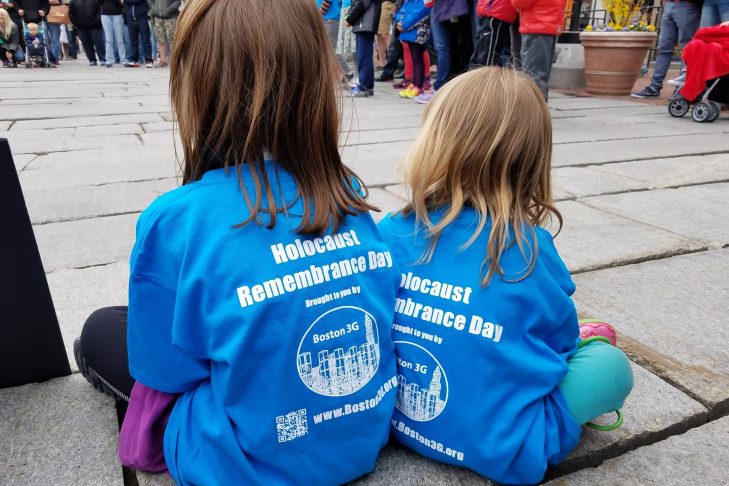In May, JewishBoston culture reporter Judy Bolton-Fasman described the scene at Boston’s Yom HaShoah ceremonies: “Tourists at Faneuil Hall strolled by groups of young families in turquoise T-shirts. Standing stock-still in a ‘frozen memorial,’ these groups were a gathering of human statues—a silent presence for a symbolic six minutes. This was their living memorial to the 6 million Jews who perished in the Holocaust. The signs they held boldly told onlookers ‘Never Forget.’”
This group consisted of third-generation survivors, part of a nonprofit group called Boston 3G. Many were with their young children, who are great-grandchildren of the survivors.
Lisa Einstein is the 3G group’s vice president. The group formed in 2009 to solidify their shared histories and to keep the survivors’ memories alive; it started with movie screenings, wine nights and volunteer activities, but blossomed into far more, something that has grown personal for her own young children.
“Many families didn’t want to leave food on the table; some were overprotective. It’s nice to have a community that understands this quirky shared piece,” she says.
These days, many of these survivor grandchildren have small kids of their own, and it’s time to teach them lessons from the Holocaust.
At this year’s May ceremony, these young children led survivors from Faneuil Hall to the New England Holocaust Memorial to place rocks that they’d hand-painted for peace. They dubbed them “Rocks of Remembrance,” much like leaving rocks at Jewish grave sites to honor the deceased.
It was a moving event, but the group’s youth education continues year-round, both within their own families and in the community. 3G often partners with organizations like Facing History and Ourselves to educate school groups about the Holocaust and the importance of tolerance and acceptance.
“We want to retell our grandparents’ stories and make sure people know that these horrific things happened and must never happen again,” Einstein says. “3G is focused on educating future generations and really bringing these stories to life, and making sure people know about these atrocities.”
The group focuses on telling students, and their own children, about the “importance of kindness, no matter what our differences,” Einstein says. “And unlike the Civil War, the Holocaust wasn’t that long ago.”
These days, she says: “We’re trying to teach our kids that they have a unique history and their great-grandparents were part of it. All of the kids are very young, but we’re also trying to teach them in simple terms that there were some very mean people in the world, but that it’s OK to be different, and it’s OK for others to be different. We want them to take pride in their Judaism and what their great-grandparents went through.”
The Rocks of Remembrance were an accessible, hands-on way to convey this lesson. After all, “We all have babies who can’t sit still for two hours at Faneuil Hall,” Einstein says with a laugh. “We want them to be involved, and we need to think about a new way to share this legacy, that Judaism is living on, and we’re alive and growing.”
Einstein has noticed the growing awareness in her own young daughter, especially after the ceremony.
“She’s starting to understand having pride and being kind to people with differences,” she says. “I remember growing up as a grandchild of a survivor, even when I was 5 years old, and going to my grandmother’s temple and lighting a candle every year to memorialize the Holocaust. Now I’m trying to start a tradition for my own kids to remember how important this is.”
Never miss the best stories and events for families, children and teens! Get JewishBoston Plus Kids.



